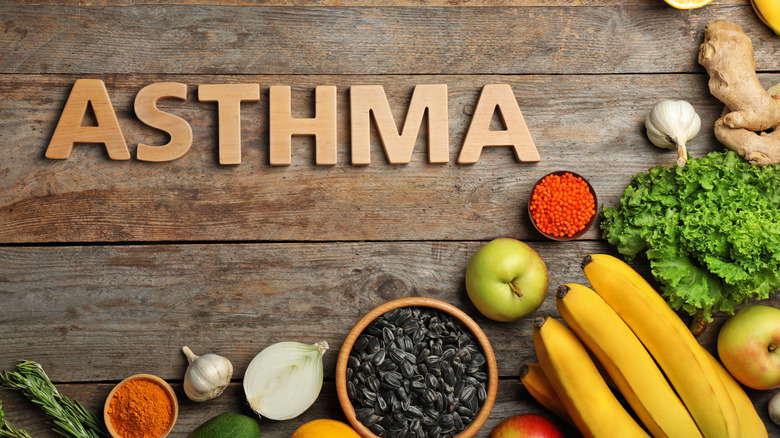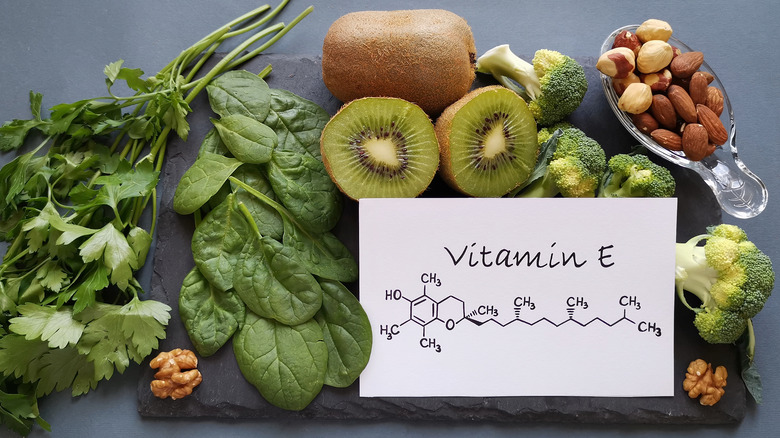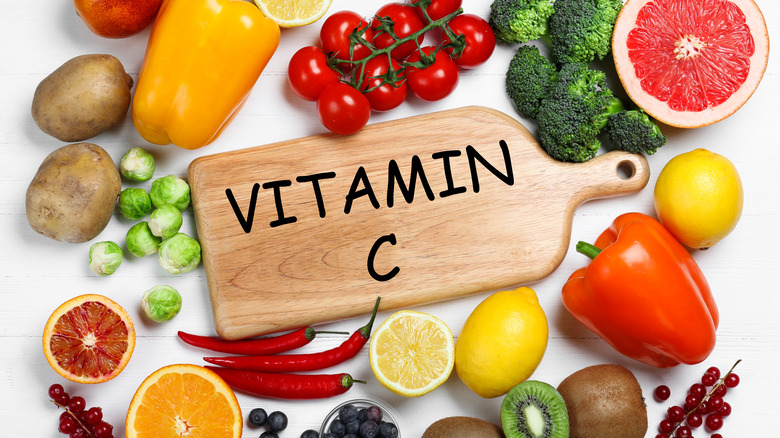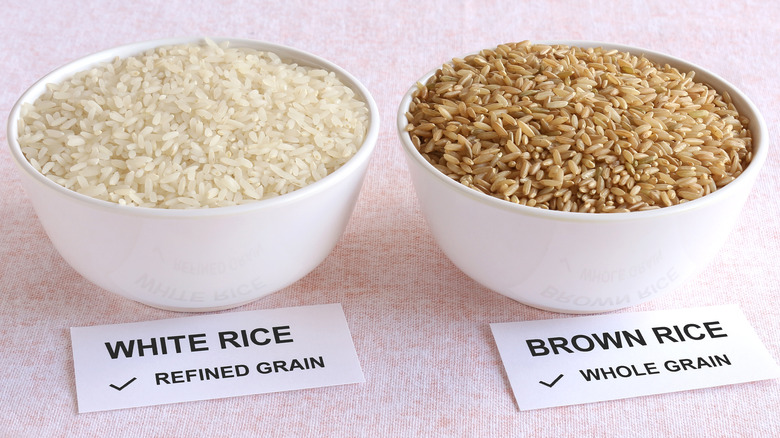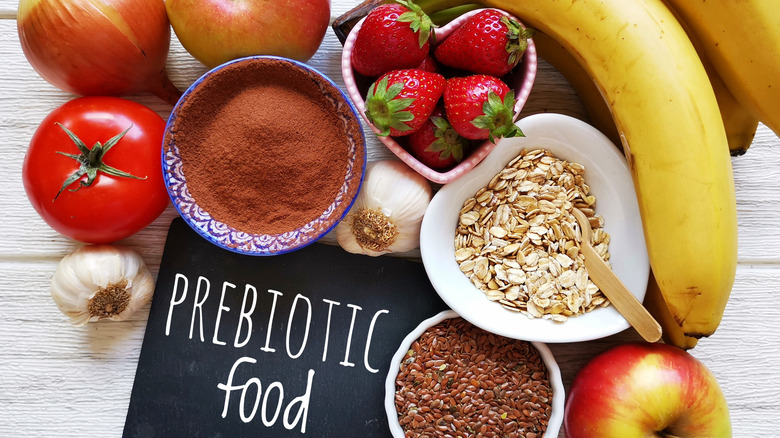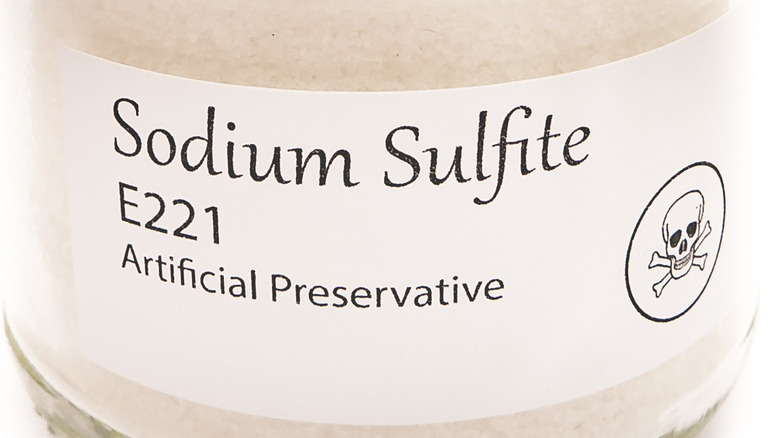7 Foods To Eat And 7 To Avoid For Asthma
Whether you have asthma or not, you're most likely familiar with its most common symptoms, which include lack of breath, chest tightness, coughing, and wheezing (a whistle-like sound produced while breathing due to an obstruction in the airways). According to the Centers for Disease Control and Prevention (CDC), while adults may also have asthma, this lung disease is most common in children, and tends to affect them in the lung run. In fact, when someone has asthma, they'll always have it. However, that doesn't mean they'll always have asthma attacks, as those only occur when something triggers it.
Per the American Lung Association, there are numerous triggers that can make asthma symptoms worse, and reducing or avoiding them may significantly help you manage it. Common asthma triggers include medical conditions such as respiratory infections or acid reflux; medicines such as aspirin or non-steroidal anti-inflammatory drugs; environmental factors such as smoke, pollen, air pollution, cold temperatures, or extreme temperature changes; common pets or animals with fur or feathers like birds, cats, dogs, or hamsters; pests; molds; exercise; stress; and strong odors.
Moreover, what you eat may also impact this condition, seeing that certain foods may help reduce asthma symptoms while others may worsen or intensify them. Here are some common foods you should eat (and some you should avoid) if you have asthma.
Eat: Fruits and vegetables
Fruits and vegetables are the easiest and tastiest way to add more antioxidants to your diet. Eating them may help reduce asthma symptoms by fighting off oxidative stress, an imbalance between free radicals and antioxidants that facilitates the onset of multiple chronic diseases (via Medical News Today).
According to a 2017 review published in Nutrients, given that asthma is an inflammatory disease, oxidative stress plays a key role in its development by constantly activating the airways' inflammatory cells. Furthermore, oxidative stress may also negatively impact airway function by inducing bronchial hyper-responsiveness (BHR), a state that leads to easily triggered bronchospasms — the contraction of the small airways in your lungs — which causes difficulty breathing.
Antioxidants can reduce airway inflammation by scavenging free radicals and protecting the airways from oxidative damage. Fruits and vegetables are rich sources of these beneficial compounds, including vitamins C and E, beta-carotene, and multiple phenolic compounds. In fact, according to research, diets with low fruit and vegetable intake are associated with greater development of allergic diseases and more severe asthma attacks. Thus, eating a balanced diet filled with these colorful foods might be something to consider.
Avoid: Dairy
Among the foods that can be problematic for people with asthma, milk and dairy products are quite a controversial topic.
Some sources explain that dairy products won't trigger or worsen your asthma symptoms unless you have asthma and a dairy allergy, which often coexist and share multiple symptoms such as wheezing, coughing, and shortness of breath (via Healthline). However, a 2020 review published in Nutrition Reviews shares numerous studies that found an association between frequent dairy intake and odds of developing asthma or triggered asthma symptoms — although it is important to note that, for the most part, they were relatively small studies.
According to the review, though it is unknown why milk and dairy products may influence asthma symptoms, there's a suspected connection between dairy intake and higher concentrations of pro-inflammatory markers. In addition, one of the studies reported an association between cheese consumption and bronchial hyper-responsiveness (BHR), which is considered a hallmark of the disease. If you choose to avoid dairy, try substituting them for soy-, almond-, coconut-, or oat-based products. Also, be sure to consume foods rich in calcium and vitamin D to avoid nutrient deficiencies.
Eat: Vitamin E-rich foods
Since the lungs are highly exposed to environmental oxidants (which in excess lead to oxidative stress and its harmful effects on lung health and asthma), stocking up on antioxidants is crucial to managing asthma symptoms, and vitamin E happens to be a potent antioxidant that you may want to consider. Per a review published in Nutrition Reviews, this vitamin may prevent damage to the membranes of human tissues caused by oxidative stress, and alpha-tocopherol — one of the most abundant forms of vitamin E — has been positively linked with lung function in people with and without asthma.
According to a 2013 study published in the American Journal of Respiratory and Critical Care Medicine, adults and children with asthma reportedly have lower levels of alpha-tocopherol in their system, and since this form of vitamin E can reduce inflammation, its increase may be beneficial for the prevention and improvement of asthma. Nevertheless, the tricky part is that while alpha-tocopherol is very helpful, gamma-tocopherol — the second most abundant form of vitamin E — may actually reduce lung function, per a 2022 study published in Free Radical Biology and Medicine.
While research has found contradictory results on the effects of vitamin E and asthma, you might find that adding vitamin E-rich foods to your diet may actually help avoid flare-ups. In that case, some foods to consider are almonds, peanuts, olive and canola oils, leafy greens, meat, and fortified cereals (via the Mayo Clinic).
Avoid: Fast foods
It is no secret that fast foods are not the healthiest choice, yet who would've thought they were directly linked to increased asthma severity? According to a 2018 review published in Respirology, aside from being associated with overweight and obesity — which are two independent risk factors for asthma — fast foods, and more specifically hamburgers, were linked to severe asthma in a dose-dependent manner, meaning that the more you eat them, the worse your symptoms will be.
The review explains that high-fat meals worsen airway inflammation in asthma. It also states that high intakes of saturated fatty acids — which are abundantly present in fast foods — lead to the release of inflammation-promoting substances and, thus, contribute to the chronic inflammation of the airways. Moreover, the review points out that consuming fast foods reduces the intake of healthier foods such as fruits and vegetables, which actually have a protective effect on asthma and its symptoms due to their anti-oxidative and anti-inflammatory compounds.
Similarly, another study published in Respirology found that people with severe asthma had a higher total fat intake and that for every 10 grams of fat consumed, the likelihood of severe persistent asthma increased by 48%. Therefore, aside from improving your diet quality, reducing your fast food intake will improve your quality of life as well.
Eat: Vitamin C-rich foods
You may already be loading up on vitamin C whenever you're feeling under the weather. The good thing is that according to research, eating your favorite vitamin C-rich foods may have additional benefits.
Per a review published in Nutrition Reviews, vitamin C's antioxidant properties may help with your asthma symptoms in multiple ways. For starters, it supports the hydration of airway surfaces, which facilitates breathing. In addition, by scavenging and reducing free radicals, vitamin C helps prevent the harmful effects of oxidative stress, which are known to worsen asthma symptoms.
Luckily, vitamin C is present in numerous fruits and vegetables. So, if you want to switch up your typical citrus fruits for other equally delicious, vitamin C-rich foods, try adding the following to your list the next time you go grocery shopping: bell peppers, tomato juice, strawberries, papaya, broccoli, pineapple, Brussel sprouts, kiwi, mangoes, cantaloupe, cabbage, potatoes, spinach, and cauliflower (via the National Institutes of Health).
Avoid: Sugary drinks
From energy drinks to sweet tea, sodas, and fruit juices, sugar-sweetened beverages comprise a wide range of highly-consumed products for adults and children alike. Unfortunately, according to research published in the Journal of Asthma, numerous studies have linked sugary drink consumption to childhood asthma. In fact, the study found that the odds of current asthma were twice as higher in children who consumed more than 500 calories from sugary drinks compared to those who reported no sugar-sweetened beverage intake, regardless of their weight.
The study lists two potential explanations for the findings. First, it states that preservatives used in these beverages to prevent spoilage (such as sodium benzoate or potassium benzoate) can cause wheezing and are known to worsen asthma symptoms. Second, it explains that the high amounts of high-fructose corn syrup used in sugary drinks might promote inflammation and cause excessive mucus production in the airways, triggering asthma attacks.
Interestingly, another study published in the British Journal of Nutrition found similar results by determining that an increased intake of high-fructose corn syrup beverages was associated with significantly higher asthma risk in children. So, swapping sugary drinks for sugar-free beverages like flavored water or herbal teas might be a better solution to quench your thirst.
Eat: Whole grains
Structurally speaking, grains are made of an inner seed called the germ, a core called the endosperm, and an outer layer called the bran (via the Harvard T.H. Chan School of Public Health). Unlike refined grains, which are stripped of the germ and bran, whole grains provide the whole package, offering multiple health benefits. For instance, both the bran and germ house several vitamins and antioxidants, and the bran is also a rich source of dietary fiber. According to recent research, both antioxidants and fiber may play an essential role in reducing asthma symptoms.
A 2020 review published in Nutrition Reviews explains that the antioxidant and anti-inflammatory effects of whole grains reduce pro-inflammatory compounds, leading to improved lung function. Both the review, as well as another 2020 study published in the journal Annals of the American Thoracic Society, state that like antioxidants, fiber has an anti-inflammatory effect that may decrease the odds of having asthma, as well as its symptoms (wheezing, coughing, and excessive phlegm production). Therefore, try to switch your refined bread, pasta, rice, or oats for their whole-grain versions, or add some quinoa, spelt, or millet to your menu the next time you feel like having a nutritious carb-rich meal.
Avoid: Common food allergens
If you have a food allergy, you probably already avoid eating certain foods to prevent allergic reactions. However, you might also want to avoid them to prevent an asthma attack, seeing that common food allergens (proteins in foods that the immune system mistakenly recognizes as harmful) can also act as asthma triggers, according to the American Lung Association.
While the exact explanation of why food allergens trigger asthma symptoms is still unknown, a 2018 paper published in Frontiers in Pediatrics shares the theory that particles of problematic foods can be inhaled into the airways, causing inflammation of lung cells and resulting in trouble breathing and other respiratory symptoms — a theory mentioned in multiple scientific studies. For instance, per a 2018 review in Current Treatment Options in Allergy, reactions to airborne food allergens were reported among passengers of a commercial flight, in which 41 out of 471 people with known peanut, tree nut, or seed allergy reported having a sore throat or wheezing after inhaling the food allergen.
In addition, not only is food allergy a risk factor for developing asthma, but asthma is also a risk factor for severe allergic reactions such as anaphylaxis, a potentially fatal reaction that can block the flow of air to the lungs due to excessive swelling of the throat or tongue. Therefore, to stay safe, avoid consuming milk, eggs, peanuts, tree nuts, shellfish, wheat, soy, and fish, which are the eight most common food allergens (via Healthline).
Eat: Vitamin D-rich foods
Vitamin D has gained plenty of attention recently for its role in immune health. Unsurprisingly, researchers have slowly directed their investigations toward the effect of the vitamin on inflammatory diseases such as asthma.
Per a 2022 study in Nutrients, evidence has found a link between low vitamin D levels and the development of childhood wheeze and asthma. Furthermore, according to another study published in the American Journal of Respiratory and Critical Care Medicine, vitamin D deficiency is associated with impaired lung function and a reduced glucocorticoid response — the main type of drug therapy used for asthma treatment. This means that simply increasing vitamin D levels could help make current treatments more efficient.
To better understand how vitamin D and asthma are related, a 2018 study in Postepy Dermatologii I Alergologii explains that low vitamin D levels affect lung development in the womb — which is why some experts even recommend vitamin D supplementation during pregnancy. In addition, deficiencies in the vitamin also seem to affect immune system regulation. In contrast, sufficient vitamin D levels seem to change the immune response from pro-inflammatory to less reactive, reducing asthma severity. Furthermore, vitamin D inhibits the production of inflammatory substances that play a critical role in asthma development. Therefore, to improve asthma control and prevent potentially life-threatening reactions, be sure to add vitamin D-rich foods to your diet, which include fatty fish such as salmon, tuna, mackerel, and trout, as well as fish liver oil (via the National Institutes of Health).
Avoid: Cured meats
Cured meats (also known as deli or processed meats) are meats that have been treated through salting, curing, smoking, drying, or canning to extend their shelf life and preserve their flavor. Some common examples include sausages, ham, cured bacon, dried or smoked meat, and beef jerky (via Healthline). Yet, while they may seem like a practical way to increase your protein intake, they have one big caveat: their intake has been long associated with an increased risk of chronic diseases such as cancer, heart disease, and diabetes, as well as mortality, according to Frank B. Hu, MD, Ph.D., Professor of Nutrition and Epidemiology and chair of the Department of Nutrition at Harvard T.H. Chan School of Public Health (via NBC News).
On top of that, recent research suggests that their intake might also be associated with worsening of asthma symptoms. Per a 2017 study published in Thorax, consuming over four servings of cured meats per week resulted in increased asthma symptoms. Their adverse effects were attributed to a higher overall inflammatory state caused by their high content of salt, unhealthy fats, and nitrite — a common food preservative — which leads to higher levels of oxidative stress. If you often rely on cured meats for convenience, try swapping them for healthier options such as canned tuna, salmon, or chicken, which are great to enjoy on the go.
Eat: Prebiotics
Prebiotics are non-digestible fibers from carb-rich sources that act as food for your gut's friendly bacteria (also known as your gut microbiota). Among their multiple benefits, they help maintain a healthy gut (per Medical News Today). Yet, what's interesting about prebiotics and gut microbiota is that they seem to be related to asthma. According to research, people with asthma seem to have a different microbiota compared to non-asthmatic individuals. Also, a low microbial diversity in early life appears to be linked to asthma later on (via the International Probiotics Association).
The link between your gut and respiratory health is known as the gut-lung axis, and it suggests that the beneficial effects that a healthy gut has on the immune system seem to influence respiratory conditions, according to a review published in Cellular Microbiology. Furthermore, per a 2015 review published in Annals of the American Thoracic Society, prebiotics and their byproducts — namely, short-chain fatty acids (SCFAs) — may offer protective effects against the development of allergic airway inflammation. In addition, the review explains that an increase in SCFAs may help modify the gut's bacterial composition, which has been linked to a lower incidence of asthma in humans. Luckily, you can easily add prebiotics to your diet by eating a variety of fruits, vegetables, and whole grains, such as apples, bananas, legumes, oats, asparagus, and onions (via WebMD).
Avoid: Carbonated drinks
For some, the bubbly texture of carbonated drinks makes them more appealing than drinking still water to stay hydrated. That said, it may come as no surprise that drinking carbonated beverages every day may have some less-than-pleasant effects on the body — a fact that's especially relevant for people with asthma.
According to the American Lung Association, foods that cause gas or bloating, such as carbonated drinks, can make breathing more difficult, which could lead to chest tightness and trigger asthma attacks. In addition, carbonated drinks can also increase inflammation levels and, with it, the risk of asthma, as explained by Dr. Jorge M. Mercado, MD., Associate Section Chief of Pulmonary, Critical Care & Sleep Medicine at NYU Langone Hospital (via Livestrong).
Thus, regardless of how refreshing they might be, you might want to avoid drinking sodas, seltzers, and sparkling waters and stick to non-carbonated beverages if you have asthma.
Eat: Omega-3 fatty acids
Omega-3 fatty acids are primarily known for their beneficial effects on heart health. These include a decreased risk of heart disease (and death in people with heart disease), a lower chance of sudden cardiac death (for people with irregular heart rhythms) or blood clots, and reduced blood pressure levels.
However, research suggests that they can also be powerful allies in reducing asthma symptoms. Per a study published in the American Journal of Clinical Nutrition, higher intakes of omega-3 fatty acids have been associated with a lower frequency of asthma in the long term in American adults.
According to a review published in Allergology International, since omega-3 fatty acids are anti-inflammatory nutrients, they offer a protective effect in inflammatory diseases such as asthma, which may positively impact the disease's development. Because omega-3 fatty acids are mostly present in fatty fish, try incorporating wild salmon, mackerel, herring, anchovies, or tuna into your diet (via the Cleveland Clinic).
Avoid: Sulfites
Sulfites are compounds commonly used as preservatives in foods and drinks to prevent discoloration and extend their shelf life. However, while they are virtually harmless to non-asthmatic people, people with asthma have a 1–2.5% chance of being sensitive to them, which could trigger mild to severe asthma symptoms that range from wheezing to anaphylaxis (per the Cleveland Clinic).
The American Lung Association explains that people with asthma should avoid sulfite-rich foods such as dried fruit, pickled foods, shrimp, maraschino cherries, bottled lemon or lime juice, and alcoholic drinks — namely, red wine — to avoid unwanted reactions. Moreover, the Cleveland Clinic also recommends checking nutrition labels for sulfite-containing ingredients such as sulfur dioxide, potassium bisulfite or metabisulfite, and sodium sulfite, bisulfite, or metabisulfite.
A consultation with a healthcare professional can also help you determine whether or not you have a sulfite allergy or sensitivity (based on certain aspects of your asthma as well as your medical history).

